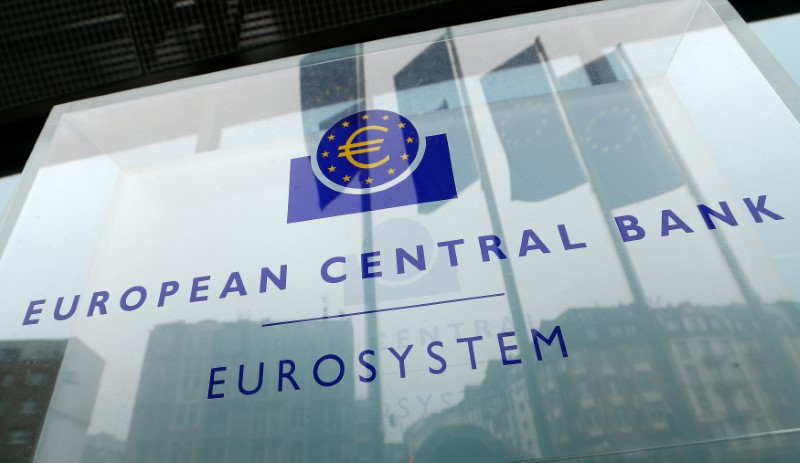(Bloomberg) -- Deflation is back on the minds of European Central Bank officials, presaging battles for President Christine Lagarde over whether the euro zone needs yet more monetary stimulus.
In sparking the biggest peacetime recession in Europe since the 1930s, the coronavirus pandemic has reawakened the image of a Great Depression-like slump in prices and wages that sucks the life out of the economy.
After the ECB extended and almost doubled its emergency bond-buying program to 1.35 trillion euros ($1.53 trillion) last week, Executive Board member Fabio Panetta cited a “resurgence of deflationary pressures.” Bank of Spain Governor Pablo Hernandez de Cos said action was needed “to ensure that risk doesn’t materialize.”
Economists are already predicting policy makers will need to ramp up the program again before the end of the year.
Yet Austrian Governor Robert Holzmann countered, saying that even if consumer prices do fall for a few months, “that’s not deflation in the economic sense.” The Bundesbank predicted support from ongoing supply disruptions and company collapses that give surviving businesses more pricing power.
“Although falling demand is putting pressure on the prices of services and industrial products, this will be mitigated by inflationary factors caused by the pandemic on the supply side.”
-Bundesbank Monthly Report
The discussion reflects a wider debate on whether the crisis, and measures to counter it, will ultimately stoke prices.
“The real issue for me is this obsession that people have, particularly in Europe, that the massive fiscal and monetary stimulus will be inflationary,” Erik Nielsen, chief economist at UniCredit, told Bloomberg Television. “For the next five years or so, I just don’t see it.”
The ECB’s differences of opinion are reminiscent of 2014, when government austerity after the regional debt crisis was weighing on prices. Then-President Mario Draghi was finely attuned to the risk and started a strategic push for massive bond purchases.
He had to fight opposition led by officials from Germany -- where the hyperinflation of the 1920s is seared into the national psyche -- who argued that the prospect of deflation was overblown. Consumer-price growth finally turned negative in December 2014 and quantitative easing was announced the following month.
It was another two years before Draghi felt able to say the risk had passed.
Deflation strikes fear into the hearts of central bankers because it’s much harder to fight than inflation, which requires painful but relatively straightforward interest-rate increases.
As prices fall, profits are squeezed until companies respond by cutting wages, which reduces demand for their products and worsens the problem. It’s a self-reinforcing cycle that can only be broken with massive spending, normally by governments with central-bank backing.
In the 1930s, constrained by the gold standard, authorities were slow to react to the downturn that followed the 1929 financial crash. Deflation in Europe only disappeared with the onset of German rearmament that culminated in World War II.
Still, this time around, money has been pumped into the global system and the economy has been wrapped in cotton wool. The surprise jump in U.S. employment reported last week raised the prospect of a faster-than-expected rebound. The European Union has even overcome its disputes over jointly issued debt to come up with a common 750 billion-euro recovery fund.
“I wouldn’t underestimate the impact that some of the fiscal measures we’re going to see unleashed on the European economy over the next couple of years will have,” said Dean Turner, an economist at UBS Wealth Management.
ECB Chief Economist Philip Lane acknowledged the upward price pressures in a blog, but said it’s clear the downsides are prevailing.
“Taken together, the scale of the increase in economic slack means that the net impact on inflation dynamics is assessed to be substantially negative in the staff projections, even when allowing for the pro-inflationary impact of some damage to supply capacity.”
-Philip Lane, ECB blog
Annual euro-zone inflation was 0.1% in May and prices fell month-on-month. While the collapse in crude oil costs is a big part of that -- another echo of the debate of 2014, when some officials said lower energy bills are a hidden stimulus -- the concern is that the trend will spread.
Investment bank Jefferies (NYSE:JEF) says the proportion of goods in the consumer-price basket that are getting cheaper has increased.
Lane avoided the word “deflation” in his blog, and Lagarde dodged a question on it in her press conference, suggesting they’re sensitive to the internal debate.
The president did however mention it at the European Parliament on Monday, saying the monetary stimulus of recent years had averted that threat and lifted the euro zone.
“These measures have not only prevented the economy from entering depressed and deflationary conditions,” she said. They “have also contributed to supporting employment and reducing financial stability risks.”
©2020 Bloomberg L.P.
